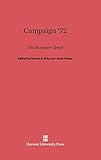Campaign ’72 : The Managers Speak / ed. by Ernest R. May, Janet Fraser.
Material type: TextPublisher: Cambridge, MA : Harvard University Press, [2013]Copyright date: ©1973Edition: Reprint 2014Description: 1 online resource (318 p.)Content type:
TextPublisher: Cambridge, MA : Harvard University Press, [2013]Copyright date: ©1973Edition: Reprint 2014Description: 1 online resource (318 p.)Content type: - 9780674366787
- 9780674366794
- 329/.023/730924
- E859
- online - DeGruyter
| Item type | Current library | Call number | URL | Status | Notes | Barcode | |
|---|---|---|---|---|---|---|---|
 eBook
eBook
|
Biblioteca "Angelicum" Pont. Univ. S.Tommaso d'Aquino Nuvola online | online - DeGruyter (Browse shelf(Opens below)) | Online access | Not for loan (Accesso limitato) | Accesso per gli utenti autorizzati / Access for authorized users | (dgr)9780674366794 |
Frontmatter -- Contents -- The Authors -- Introduction -- 1. Before the Primaries -- 2. The Primaries -- 3. The Conventions -- 4. The General Election -- 5. The Press in the Campaign -- 6. Looking to '76 -- Appendix A. Some Campaign Dates -- Appendix Β. Some Campaign Statistics -- Index
restricted access online access with authorization star
http://purl.org/coar/access_right/c_16ec
In January 1973, for the first time in American history, principal participants in a major election met to discuss the science and the art of campaign strategy: the planning, calculation, contrivance, miscalculation, and mischance that determine what the electorate sees. Here campaign managers, pollsters, and journalists met to compare notes on their techniques and tactics and on their successes and failures as they reviewed the events of the primaries and election: the poor decisions made in the face of complex state primary laws; the decline of Muskie and the rise of McGovern; the significance of issues versus Nixon's image; the effects of party reform on the Democratic convention; the credentials fights; the twists of strategy during the final months of the campaign; the way the press covered the campaign and how reporters were treated by the various staffs; the lessons for 1976 drawn by reporters and campaign people. The straightforward exchanges took place at the Harvard Conference on Campaign Decision-Making. Eighteen key people participated, including those in the campaigns of Nixon, McGovern, Wallace, Muskie, Humphrey, Jackson, and McCloskey. Four political correspondents--David Broder, James Naughton, Al Otten, and James Perry--expertly guided the conversation, probing for additional insights. The transcript of the conference--oral history at its best--has been carefully edited and makes absorbing reading. Included are brief sketches of the participants, a chronology of major events of the campaign, tables of campaign statistics, and a full index.
Mode of access: Internet via World Wide Web.
In English.
Description based on online resource; title from PDF title page (publisher's Web site, viewed 29. Nov 2021)


